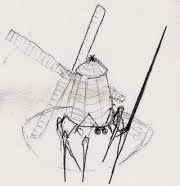'Feel good' .
That's a nice sloppy phrase, not very exact. It is similar to 'mouth feel', and maybe it is 'mind feel' I am talking about. Anyone want to coin a word for the sensation of a thing that seems 'ugly' or ' not right' when thought about?
Shall we rehabilitate 'ugsome' for this idea?*
But I don't want to talk about ugsome numbers. The number 6,000,000 could be ugsome, when considered as a summation for the Holocaust. The number -1,500 could be ugsome, if its the value of a tax bill.
What I am talking about is a number that is unpleasant, without having any conscious** context attached to it.
I was lying in bed when Liz asked what I was thinking about, and at that moment I realized I was thinking about couth, and uncouth numbers. She instantly understood what I meant, and agreed that there were numbers she found uncouth as well: 73 for example, but not 37.
There seems to be more odd uncouth than even, but our sample (n < 100) is small enough to skew an expected 50/50 distribution. It seems like some decades had a different distribution than others, but again, that may be a effect of sample size.
30,32,33,34,35,36,38,37, all seemed couth, where only 70,72,75,76,77 were couth.
Now this leads to a small fact about arithmetic: there are three ways of handling a small arithmetical transaction such as 27 +14:
- Counting on fingers or with tokens (This is how computers do it)
- Algorithmic such as with paper and pencil,
- Memorization, e.g. mental table-consultation.
What numbers do we encounter in everyday life, and does each person develop a mental fingerprint of numbers that is different? Or, like with Liz and I, the list of couth/uncouth numbers should nearly match?
Is anyone looking for a thesis concept that combines mathematics and psychology? The Tiny Lab is not going to get around to writing 'Historical Arithmetic Experience Manifested in Subjective Affectivity Gauges', as the Tiny Lab is a little busy with 'Sauropod Beat Frequencies: Femur kinematics as a Metric of Scale-Dependent Improvisational Tempos.'***
I may however, sit some people down with a list of numbers and see if I can gather a complete list up to, say 200. It would be interesting to do this in conjunction with a polygraph, to see how far the ugsome effect goes.
* Old word, 15th century, Norse roots, useful.
**You cannot have thought without unconscious attachments.
***I.E. that a dinosaur is going to play rock music at a different tempo, because the natural tapping-speed of its legs is much much lower than a humans.


No comments:
Post a Comment